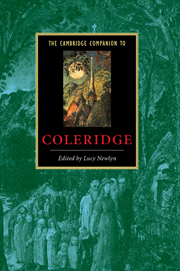9 - The critic
from Part II - Discursive modes
Published online by Cambridge University Press: 28 May 2006
Summary
Coleridge thought, talked and wrote about poetics and criticism throughout his life. Until 1820, these were often primary concerns; at other times, and later in his life, his ideas about literature were ancillary to his work on philosophy, religion, psychology, history or language. Yet the task of summarising Coleridge's philosophy and practice of literary criticism is a challenging one, because he prepared almost none of his criticism for publication and his notes were left in a chaotic form. Most of what we know about his critical opinions derives from the 'Shakespearean criticism' - not a coherent text, but surviving notes and reports concerning public lectures that Coleridge presented between 1808 and 1819. There is also a multitude of passages on literary criticism in Coleridge's Notebooks and in his copious marginal annotations to editions of Shakespeare and other books. Both the Notebooks and the marginalia overlap extensively with the public lectures, for Coleridge tended to lecture extempore based on scraps of paper and annotated volumes that he brought with him into the lecture hall. Some of his major ideas about criticism did take published form in Biographia Literaria (1817), but examining the notes and fragments that testify to his practice as a critic before and after the publication of Biographia allows us to see how those principles developed, and how Coleridge applied them to the study of Shakespeare, Milton and major European writers.
- Type
- Chapter
- Information
- The Cambridge Companion to Coleridge , pp. 142 - 155Publisher: Cambridge University PressPrint publication year: 2002
- 1
- Cited by



